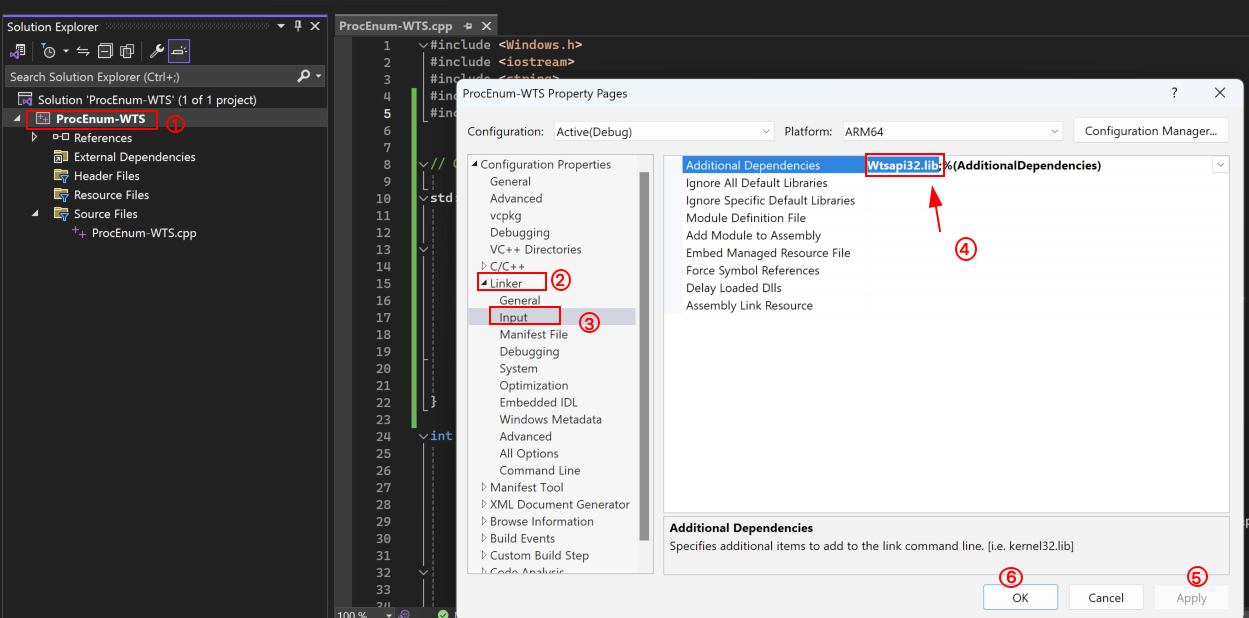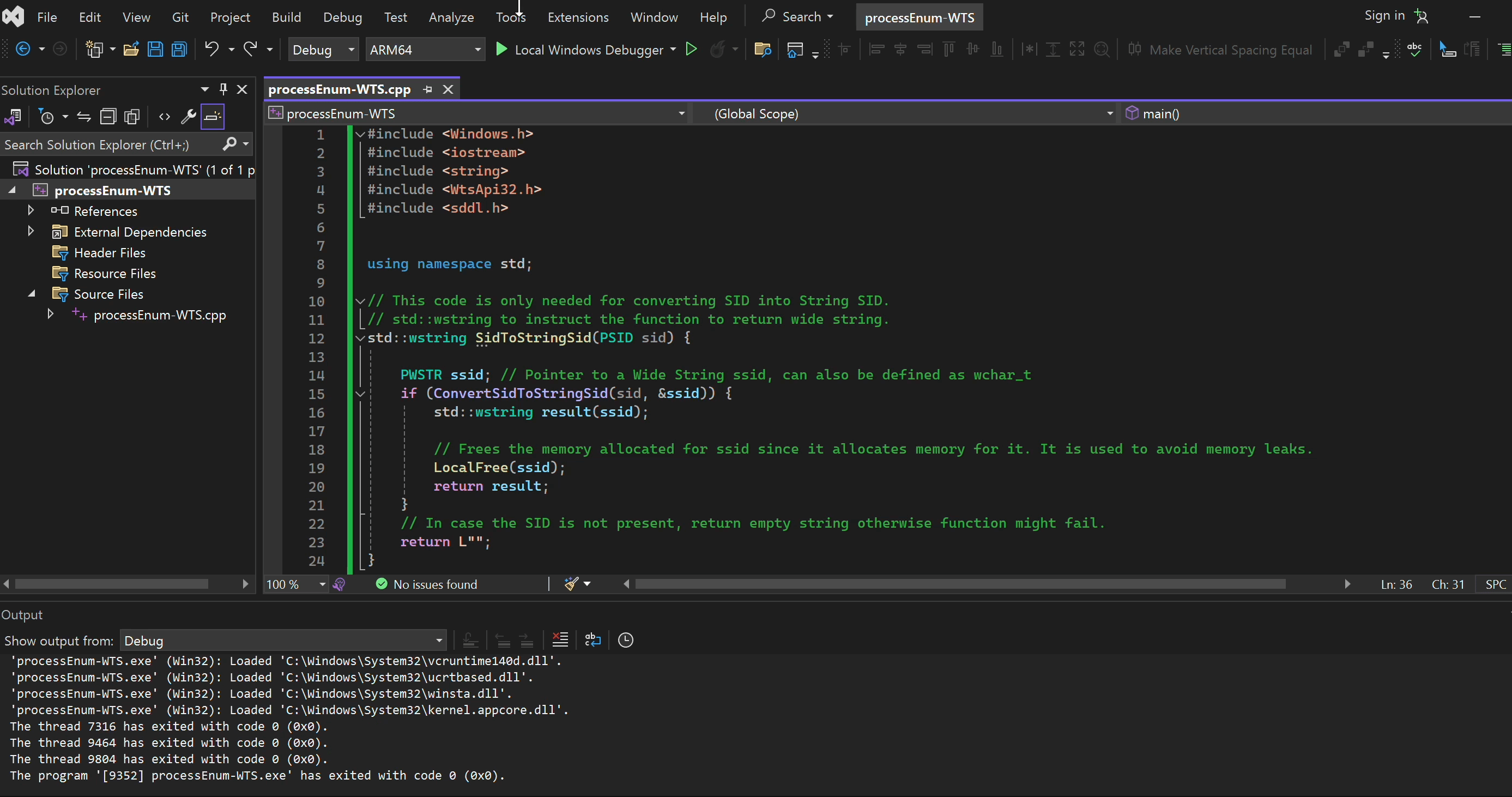Windows Terminal Services - WTS API
Windows also contains WTSEnumerateProcessesExW function to gather inforamtion about currently active processes on the remote session via RDP or Virualization. It is not necessary for this to work only on a remote machine as it also has the capability to enumerate the running processes local machine. The target can depend on the value you pass to its handle.
This function contains five arguments: hServer, *pLevel, SessionId, *ppProcessInfo, *pCount.
- hServer: Opens a handle to open Remote Desktop session to the server. If needed to be done on the local machine, we can specify WTS_CURRENT_SERVER_HANDLE value on it.
- *pLevel: It is a pointer which defines what kind of information is needed in return. Inorder to get maximum information, we can specify WTS_PROCESS_INFO_EX which is equivalent to 1 otherwise 0.
- SessionId: Specify which sessions to use inorder to enumerate the process. Process can be dependednt to different users logged in into the machine. To get the maximum result, we can specify WTS_ANY_SESSION to get list of all processes running by all users.
- *ppProcessInfo: It is a pointer which contains the references to all the information gatherred via WTS_PROCESS_INFO_EX function.
- *pCount: It is a pointer which contains the number of processes captured. This is used to iterate through the list of process.
SYNTAX
1
2
3
4
5
6
7
BOOL WTSEnumerateProcessesExW(
[in] HANDLE hServer,
[in, out] DWORD *pLevel,
[in] DWORD SessionId,
[out] LPWSTR *ppProcessInfo,
[out] DWORD *pCount
);
We will break down codes into different chunk to understand it on better way. The first approach is to define the necessary headers in the code. The header Wtsapi32.h is used to initialize the needed functions.
1
2
3
4
5
6
#include <Windows.h>
#include <iostream>
#include <string>
#include <WtsApi32.h>
using namespace std;
Define the flags needed on WTSEnumerateProcessesExW as desribed above and create the function. The function will return False if failed and returns non zero if succeeds.
Here on the below code we suggested the program to enumerate the process on the local machine, asked for all the detailed information about the process, defined the pointer to an array of WTS_PROCESS_INFO_EX structure which contains the information about running processes like SessionId, ProcessId, ProcessName, UserSid, NumberofThreads, HandleCount and much more along with the pointer which points to the variable that contains the number of structures returned by *ppProcessInfo.
As we know, &processInfo is used to obtain the address of the variable which is a pointer to a structure of type WTS_PROCESS_INFO_EX. But the function WTSEnumerateProcessesExW expects the fourth parameter to be of type LPWSTR*, which is a pointer to a wide string (i.e., a wchar_t*). However, processInfo is declared as a pointer to a WTS_PROCESS_INFO_EX structure and to make &processInfo compatible with the function’s expected parameter type, we cast &processInfo to LPWSTR* using (LPWSTR*)&processInfo. This tells the compiler to treat the address of processInfo as a LPWSTR*, thus allowing the function to write to the pointer processInfo in a way that aligns with its definitions. You can learn more about pointers here.
1
2
3
4
5
6
7
8
9
10
11
12
13
int main() {
HANDLE hMachine = WTS_CURRENT_SERVER_HANDLE; // Use local machine for the enumeration
DWORD infoLevel = 1; // All detailed information is requested.
WTS_PROCESS_INFO_EX* processInfo; // Pointer to an array of WTS_PROCESS_INFO_EX
DWORD noOfProcess; // Store the number of processes enumerated.
BOOL WTSProcess = WTSEnumerateProcessesExW(hMachine, &infoLevel, WTS_ANY_SESSION, (LPWSTR*)&processInfo, &noOfProcess);
// If the function fails, exit the program.
if (WTSProcess == FALSE) {
return 0;
}
Now that we have created the function and handled the error, we can iterate over the values in the noOfProcess variable and print the retrieved information. Since processInfo is an array, the code snippet auto& pInfo = processInfo[i] iterates through the ith index and assigns it to the variable pInfo.
The auto& is used to tell the compiler to figure out the data type of pInfo based on the type of processInfo[i], which is WTS_PROCESS_INFO_EX. You can also write WTS_PROCESS_INFO_EX& pInfo = processInfo[i]; instead to explicitly specify the data type. The pInfo variable holds information such as Process ID, Session ID, number of Threads, and Process Name.
As per the documentation, while using WTS_PROCESS_INFO_EX, we need to free this structure by calling the method WTSFreeMemory.
1
2
3
4
5
6
7
8
9
10
11
12
13
14
15
16
17
// Just structuring the print format
wprintf(L"%-14ls %-10ls %-20ls\n", L"ProcessID", L"Session", L"Process Name");
wprintf(L"%-14ls %-10ls %-20ls\n", L"----------", L"----------", L"----------");
//
for (DWORD i = 0; i < noOfProcess; i++) {
auto& pInfo = processInfo[i];
wprintf(L"%-14lu %-14lu %-20ls %-30ls\n",
pInfo.ProcessId, pInfo.SessionId,
pInfo.pProcessName);
}
WTSFreeMemory(processInfo);
return 0;
}
The method WTSEnumerateProcessesEx also contains a capability to retrieve the information about current user running the process. This can be useful while enumerating the privileges for the enumerated processes. For this, we need to use ConvertSidToStringSidW inorder to convert SID into printable format to supply it into wprintf statement.
SYNTAX
1
2
3
4
BOOL ConvertSidToStringSidW(
[in] PSID Sid,
[out] LPWSTR *StringSid
);
Here PSID Sid is a pointer to the SID structure which we can supply by providing pUserSid. We need to call this function and pass its argument as pInfo.pUserSid on the print statment. The next argument LPWSTR *StringSid defines the expected output. On this case, by pointing it to wide string i.e Unicode text.
Create a Function to Convert SID into printable format using below code. This function also requires the header sddl.h to be added on the header section. #include <sddl.h>
1
2
3
4
5
6
7
8
9
10
11
12
13
//std::wstring to instruct the funtion to return wide string.
std::wstring SidToStringSid(PSID sid) {
LPWSTR ssid; // Pointer to a Long Pointer to Wide String, can also be defined as wchar_t*
if (ConvertSidToStringSidW(sid, &ssid)) {
std::wstring result(ssid);
// Frees the memory allocated for ssid since it allocates memory for it. It is used to avoid memory leaks.
LocalFree(ssid);
return result;
}
// In case the SID is not present, return empty string otherwise function might fail.
return L"";
Call the function SidToStringSid inside print statement and pass the value as processInfo.pUserSid. The function c_str() is used when you need to pass the contents of a std::string or std::wstring, otherwise the SID value will be empty. Replace the above wprintf statement with:
1
2
3
4
5
6
7
8
9
10
11
12
13
// Just structuring the print format
wprintf(L"%-14ls %-10ls %-20ls %-30ls\n", L"ProcessID", L"Session", L"Process Name", L"SID");
wprintf(L"%-14ls %-10ls %-20ls %-30ls\n", L"----------", L"----------", L"----------", L"------------------------------");
//
for (DWORD i = 0; i < noOfProcess; i++) {
&auto pInfo = processInfo[i];
wprintf(L"%-14lu %-14lu %-20ls %-30ls\n",
pInfo.ProcessId, pInfo.SessionId,
pInfo.pProcessName, SidToStringSid(pInfo.pUserSid).c_str());
}
You can further convert that SID into username using LookUpAccountSidW function.
Before building the project, you will also require to include the dependency Wtsapi32.lib on it.
Run the code using elevated privileges to enumerate the maximum SIDs.
References

